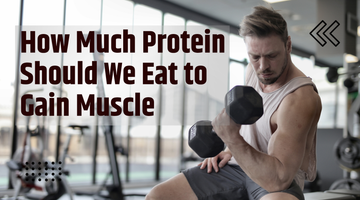
If muscle gain had a secret ingredient, protein would be it. But just piling on chicken breasts and protein shakes won’t magically turn you into a fitness icon. The real question is: how much protein should we eat to gain muscle—without overdoing it or wasting effort?
Whether you're a gym newbie or a seasoned lifter, finding that sweet spot can make all the difference in your progress. Let’s break it down so your gains don’t just come from hard work—but smart eating, too.
Understanding Daily Protein Intake for Muscle Gain
When it comes to building lean muscle, your daily protein intake is a cornerstone. Your body uses protein to repair and grow muscle tissue after workouts. Without enough of it, you might hit a plateau—or worse, lose hard-earned gains.
The ideal protein intake for muscle growth is often quoted as 1.2g–2.2g of protein per kg of body weight. For example, a 70 kg (154 lb) person would aim for 84g–154g per day depending on training intensity.
Protein Intake Chart by Body Weight
|
Body Weight (kg) |
Minimum Daily Protein (g) |
Active Muscle Gain Target (g) |
|
60 kg |
72g |
132g |
|
70 kg |
84g |
154g |
|
80 kg |
96g |
176g |
Why Protein Is Critical for Muscle Building

Protein for muscle gain isn’t just about post-workout shakes—it’s about giving your body what it needs 24/7. When you strength train, you create tiny tears in muscle fibers. Protein repairs these tears and builds them back stronger.
This is how you gain muscle mass. Protein also plays a role in hormone regulation, immune function, and satiety—keeping you full and energized during the day.
So, if your goal is strength or muscle gain, your protein game needs to be dialed in.
Best Protein Sources for Muscle Growth
To hit your protein requirements for muscle gains, you need the right mix of food and supplements. Here are some excellent protein foods for muscle gain:
- Chicken breast (31g per 100g)
- Salmon (25g per 100g)
- Eggs (6g per egg)
- Greek yogurt (10g per 100g)
- Lentils and chickpeas (8–9g per 100g cooked)
- Whey protein powder for muscle gain (20–25g per scoop)
Whey protein for muscle gain is fast-absorbing and great post-workout. It's one of the best protein for muscle gain options available—especially for busy folks.
How to Structure a High-Protein Diet for Muscle Gain
Hitting 150g of protein per day with random meals is tough. You need a plan. Here’s how a high-protein diet for muscle gain could look:
Sample High-Protein Day
- Breakfast: 3 scrambled eggs + oats with Greek yogurt (35g protein)
- Snack: Protein smoothie with whey + banana (30g protein)
- Lunch: Grilled chicken wrap + hummus (40g protein)
- Snack: Cottage cheese + almonds (20g protein)
- Dinner: Salmon + quinoa + steamed veggies (40g protein)
Consistency is key—spread protein across meals to maximize muscle protein synthesis.
High-Protein Meals That Fuel Results
Building muscle doesn’t mean boring food. In fact, high-protein meals for muscle gain can be delicious and satisfying:
- Turkey chili with beans
- Chicken stir fry with edamame
- Beef and black bean burrito bowls
- Egg muffins with spinach and feta
- Quinoa salad with grilled shrimp and avocado
These meals not only support your muscle gain protein needs but keep you full and fueled for the next gym session.
Is More Always Better?
So, should you just chug protein shakes all day? Not quite. Once you meet your target (like 1.6–2.2g per kg of body weight), extra protein won’t necessarily lead to more muscle.
Your body needs carbs and fats too. Excess protein can be stored as fat or simply excreted. The key is balance.
That said, if you’re struggling to meet your daily intake, whey protein powder for muscle gain is a helpful and affordable tool.
Tailoring Protein Needs to Your Goals
Your protein to gain muscle mass needs vary depending on:
- Age: Older adults may need more for muscle maintenance
- Activity level: More intense workouts require more protein
- Goals: Fat loss vs. muscle gain may change your ratios
- Body composition: Leaner individuals often need more protein per kg
If you’re unsure where to start, aim for 1.6g/kg as a solid middle ground—and adjust based on how your body responds.
Final Thoughts
When it comes to building muscle, protein is your powerhouse—but it's all about getting the right amount. The key is to tailor your protein needs to your body, activity level, and fitness goals. With the right balance of nutrition, training, and consistency, muscle growth becomes not just possible—but sustainable.
Ready to fuel your fitness journey the right way? At Thrive & Well, we’re here to support every rep, every goal, and every level. From premium gear to holistic wellness products, we help you stay strong, balanced, and inspired. Visit us today and thrive with purpose.
FAQs
Q: How much protein do I need to gain muscle?
To gain muscle, aim for 1.6–2.2g of protein per kg of body weight per day. For a 70 kg person, that’s about 112–154 grams daily.
Q: Is 100 grams of protein enough to build muscle?
It depends on your body weight. If you’re under 70 kg, it may be sufficient. But most active people will need more to support optimal muscle growth.
Q: What is the best protein for muscle gain?
Whey protein is one of the best choices due to its high leucine content and fast absorption. However, whole foods like chicken, fish, and legumes are essential too.
Q: How can I get enough protein in a vegetarian diet?
Include lentils, tofu, tempeh, seitan, Greek yogurt, and protein shakes. You can absolutely meet your muscle gain protein needs without meat.




